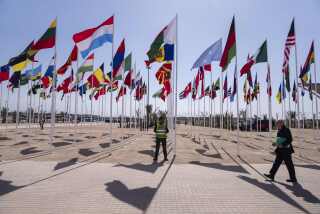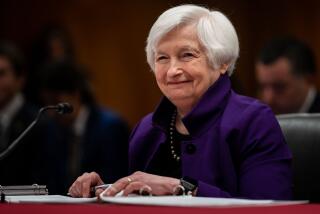Time to Reweave the World’s Financial Safety Net
- Share via
NEW YORK — Imagine a map of the world. In mid-1997, when Thailand’s economy became the first in Asia to collapse, we could have colored that country red. Now, only 14 months later, the entire developing world would be crimson. The worst international economic crisis in 50 years, which no one foresaw, has ravaged two-thirds of the globe. Standards of living, so painfully raised, are falling. The U.S. economy and financial markets, initially expected to escape unscathed, are also damaged.
Stunned observers are asking whether the international economic and financial system is broken. Several larger developing nations that were pursuing open-market policies for years, including Hong Kong, Malaysia and Russia, are reversing course. They are, in effect, dropping out of the global economy. There are increasing calls for curtailing the worldwide system of floating exchange rates and free flows of capital. Previously, these were icons of global economic progress.
But our international economic system, based on open and competitive markets for goods and capital, is the right one. It is the safety net underneath that is torn and needs repair. Resources for the International Monetary Fund, emergency lender to governments, must be vastly expanded. An early-warning system on financial and economic weaknesses and individual nations is long overdue. The United States and Europe should engineer a lowering of worldwide interest rates now to cushion against global recession and deflation.
It is important to understand how a collapse of this magnitude could have happened and whether its spread can be stopped, as well as the flaws in the international system that have been exposed. These are the crucial questions that must be answered--and fast.
Let’s begin by understanding the illness. First, a part of the problem is the classic tendency of financial markets to overshoot, both on the upside and the downside. As Federal Reserve Chairman Alan Greenspan observed last week, they are usually too euphoric or too pessimistic. The current, wholesale investor boycott of all developing countries is a prime example.
Second, a group of Asian economies is sicker than anyone realized. A combination of complacent global investors and poor data issued by these countries enabled them to appear healthier than they were.
It turned out that much of the recent growth in countries such as Thailand, Indonesia, South Korea and Malaysia was artificial. For reasons of cronyism and politics, their governments had induced local banks to shovel loans into unproductive enterprises. Foreign lenders also were eagerly providing financing. The result was overcapacity, unprofitability, bad loans and a dependence on foreign capital, usually denominated in dollars.
When the real condition of numerous industries and banks became clear, investors fled. They sold local assets so aggressively that currencies fell sharply. To defend them, nations depleted their treasuries and verged on national insolvency. This prompted a series of huge, IMF-led Asian bailouts. They succeeded in preventing defaults, but not in averting severe declines in their financial markets and economies.
Third, the world’s second-largest economy, Japan, has been the victim of unprecedented policy errors. The result has been a severe credit crunch and the worst postwar recession. The Japanese banking system has lost almost all its true capital and cannot lend. Because Japan is the largest market for goods and services of other Asian economies, its weakness has depressed the region. Indeed, it is millstone around the neck of the entire world economy.
Unlike the savings-and-loan crisis here, in which our authorities acted decisively, Tokyo has not addressed this problem. There is political paralysis and deepening recession. Without a functioning banking system, no economy can grow. Japan is suffering that fate.
Fourth, the IMF is the world’s designated emergency lender and crisis manager, but it is almost out of money and suffers from a leadership crisis. The U.S. Congress has refused to support additional funding for the agency and has undermined its credibility. Investors know larger developing nations don’t have the usual safety net afforded by the IMF. They aren’t willing, therefore, to stick with those countries or return to them. This has worsened the crisis.
Nonetheless, the spread of this international economic crisis can be contained. It will not plunge the entire world into depression. The self-correcting character of financial markets will provide part of the solution. Today’s investor boycott of essentially healthy countries will run its course. The Hong Kong and Mexican markets, for example, will recover because their long-term economic outlooks are sound.
In addition, the leadership vacuum in Tokyo and recessionary conditions there will not last. Japan is a rich country that will not tolerate a needless and prolonged recession. The United States took far too long to get its budget deficits under control, and Tokyo is similarly guilty of procrastination. But powerful nations don’t labor under such imbalances indefinitely.
Unfortunately, a number of the sickest countries face great pain. There is no quick recovery for Indonesia, South Korea and the like. Their financial systems must be overhauled. Their standards of living will be under pressure, many businesses will fail and high inflation will persist. For example, Mexico has recovered fairly well from its 1994 collapse, but its poverty level is still higher than the precrisis level.
Open markets, free flows of capital and globalization have not failed the world. South Korea did not find itself with overcapacity and unprofitability because of capitalism. It isn’t the cause of Russia’s inability to collect taxes, either.
The opposite is true. These nations have not met the basic tests of capitalism. When capital can flow freely, it favors performance and punishes failure, just like any competitive system. Yes, the degree of favoritism or punishment is often excessive. But the bottom line is that a group of nations were economically mismanaged and resisting truly open markets.
In the United States, if a company’s earnings rise, so does its stock price, and vice versa. Around the world, if a nation’s economy is promising, capital is attracted and investment and national income rise. But if that economy stumbles, particularly if it’s a developing one, capital pulls out. Those are the benefits and costs of competition.
Does this mean Darwinism is the only rule for the international economy? No. It has long been recognized that buffers and cushions are necessary. The modern world’s monetary system was founded on this principle. But, the harder question is whether this crisis has exposed important weaknesses in the safety net that must be fixed. The answer is yes.
First, the world’s emergency lending facility, through the IMF, is far too small. There are now trillions of dollars coursing through world markets, but the IMF is capitalized as if it were a 1960s institution. Its current lending capacity appears to be less than $50 billion. Such financial resources should be exponentially greater than the IMF has requested, let alone received.
The reality is, larger rescue packages will be necessary. If Mexico required a $52-billion rescue in 1994, and South Korea needed $57 billion last year, the next requirement will be larger. If the funds are unavailable, the damage to individual nations and the world system will be deeper and longer lasting.
Yet, the House of Representatives refuses to support even paltry sums. That is the equivalent, to paraphrase Franklin D. Roosevelt, of refusing to extinguish the fire consuming your neighbor’s home. The House must wake up.
Second, the world does not have an early-warning system. Though several Asian economies were sick, there were no real warnings, even to the ailing countries. The U.S. private credit-rating agencies are not yet up to this. There is political opposition to any such role for the IMF, on the ground that warnings themselves could precipitate crises.
This is bureaucratic shortsightedness. In exchange for IMF membership, nations should be required to supply accurate economic and financial data. If that data suggests structural weakness, the IMF should say so. An earlier, smaller crisis is better than a later and deeper one.
Finally, the U.S. and Europe must realize that this crisis puts them at economic risk, too. That’s why their stock markets have fallen so sharply. But with Tokyo disabled, they are the only engines of world liquidity and the bulwarks against deflation. In particular, it is time for them to engineer a lowering of world interest rates to liquefy banking systems and provide a stimulus to demand. That should occur now.
The global march toward open and freely competitive markets should and will continue. Nations can briefly behave like ostriches, trying to withdraw from the world, but that’s self-defeating. Yes, this crisis has exposed weaknesses in the international economic system. But they can be fixed, and it is the responsibility of the industrialized world to do it.
More to Read
Inside the business of entertainment
The Wide Shot brings you news, analysis and insights on everything from streaming wars to production — and what it all means for the future.
You may occasionally receive promotional content from the Los Angeles Times.










